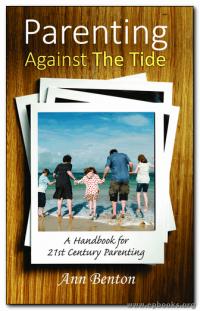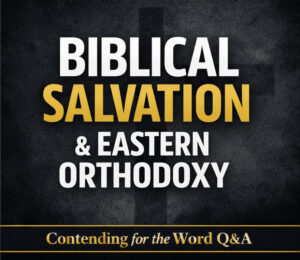⏱️ Estimated Reading Time: 5 min read
As a relatively new parent of an adopted 13 year old, I definitely will raise both hands if asked whether parenting is a rough and tumble task. The responsibility of raising a child in the fear and admonition of the Lord in a society that at every turn seeks to undermine godly parenting principles makes the task all that more difficult. We live in an age where words like discipline are viewed with disdain in favor of a relative free for all approach with child rearing. Whatever makes them happy regardless of future consequences not just for them as productive adults but for society at large let alone the families they will someday lead is quite frankly a passing fancy in the minds of most. Ann Benton, author of numerous books on parenting and the family, has provided an excellent tool with her latest book Parenting Against the Tide: A Handbook for 21st Century Parenting.
The focus of Benton’s book is to address the commonly promulgated and utilized parenting myths in vogue today such as an over-emphasis on self-esteem, the confusion of gender roles, the rejection of biblical discipline, relativism, lack of communication skills within the family, poor spending habits, and the setting of life goals,to name only a few subjects she addresses. She aptly notes the reason she wrote this book was to help Christian parents recognize that the “majority of modern parenting advice, however nice and cozy it sounds, is rooted in a worldview that is quite foreign to the Bible and this very much affects the kind of advice that is given.” Given that the Bible is quite clear on matters related to parenting, it is refreshing to read a book such as Benton’s that wades through the clatter and focuses on sound biblical truths on child rearing and matters related to the family.
For example, one of my favorite parts of this book was Benton’s discussion of the postmodern penchant for relativism which flies in the face of the absolute truth claims made in Scripture. Many in society like to make the claim that Christian parents are indoctrinating their children. A perfect example of this position is in relation to the creation/evolution debate. Evolution proponents such as Bill Nye and Richard Dawkins have often averred that teaching children creation is akin to indoctrination and child abuse. Benton does a marvelous job of demonstrating the vast difference between indoctrination and teaching noting “when it comes to passing on the baton of truth to our children…we know at once that we are not in the business of forcing a mantra on our children or of making assumptions about them. We will teach them; we will engage their developing minds.” She then outlines what that looks like in real everyday practice with the powerfully practical passage of Deuteronomy 6 as a backdrop for that discussion; a passage that is pregnant with sound biblical guidance on what teaching children from a biblical framework is all about.
Another excellent aspect of this book is Benton’s discussion of right and wrong. She correctly states that “unless a parent is willing to meet the right and wrong question head on, and be clear and convinced about the answer he/she will find raising children very hard work indeed.” Children love to ask the question why when told by their parents to do or not do something. A wishy-washy response if one is even given to such a question results in a child not understanding matters of right or wrong or where the foundation for right and wrong behavior is derived. Responding to the common parenting myths of naturalism, happiness, and consensus, Benton provides the biblical structure for properly defining issues of morality to include God as the ultimate law-giver, understanding humanity being made in God’s image, noting the impact of the fall, properly grasping the job description of the parent, and noting the proper balance between law and grace. These points will help the parent have a defined and consistent biblical worldview which Benton saliently declares “will enable you to maintain a moral framework in disciple” as well as avoiding the “need to resort to bribery which is a mere arbitrary and quite cynical manipulation of variables to get the desired end-product.”
Finally, I truly appreciated the practical application section at the conclusion of each chapter. It is one thing to provide a barrage of helpful principles and quite another to help the reader apply those biblical principles where the rubber meets the proverbial road which is in this case the daily grind of parenting. Benton does the latter by giving the reader some valuable questions for further thought and consideration based on the concepts and discussion found in that particular chapter. These are questions parents can sit down and discuss amongst themselves that will certainly provide an opportunity for an honest and hopefully frank analysis of how they have been approaching parenting their child or children.
I highly recommend this book for all parents. Benton’s honest and engaging writing style notes the failures of modern societies parenting methodology while presenting a clear and biblically sound response that will serve parents well that take the time and effort to read and apply the truths and concepts found in this timely and excellent book. I know my wife and I will be utilizing what we have read in the parenting of our teenage daughter.
This book is available for purchase from EP Books by clicking here.
I received this book for free from EP Books for this review. I was not required to write a positive review. The opinions I have expressed are my own. I am disclosing this in accordance with the Federal Trade Commission’s 16 CFR, Part 255 : “Guides Concerning the Use of Endorsements and Testimonials in Advertising.”



